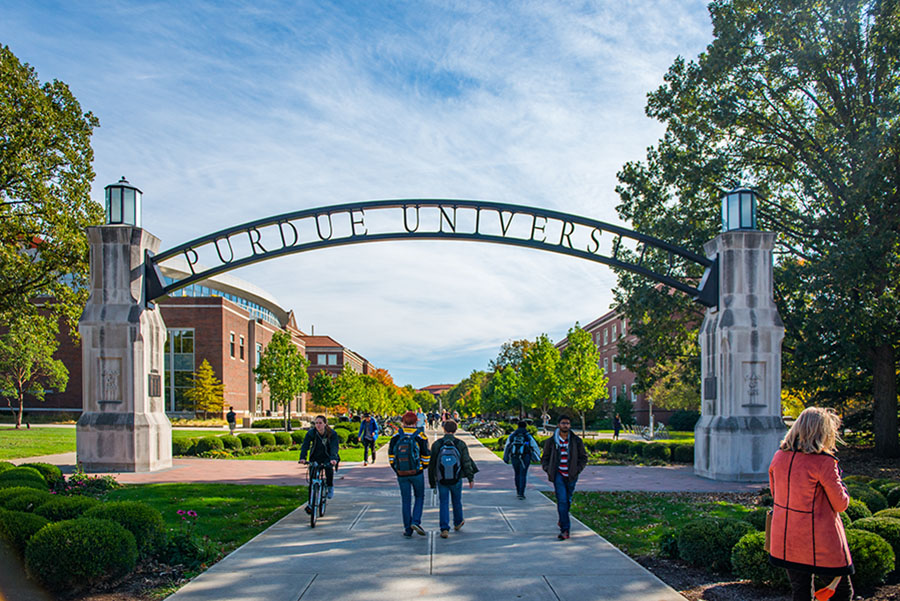Manufacturing Day at Purdue features the launch of 3 major manufacturing activities

Each year, the U.S. Department of Commerce holds Manufacturing Day on the first Friday in October to show students, parents and the public what modern manufacturing is all about. The fourth industrial revolution is rapidly changing our world. New advanced manufacturing technologies bring about whole new careers, requiring a skilled workforce interested in pursuing them. From bioengineers to data analysts to robotics technicians, and all the operations in between, Purdue Engineering is at the forefront of the revolution.
This Manufacturing Day, Oct. 4, Purdue will celebrate its role in advancing new manufacturing technologies with three major events.
Lyo2040 Technology Roadmap for Pharma/Biotech Manufacturing and Groundbreaking Event
On Oct. 4, Purdue University will unveil a pivotal roadmap focused on advancing pharmaceutical and biotechnology manufacturing as part of a groundbreaking event for the William D. and Sherry L. Young Institute for Advanced Manufacturing of Pharmaceuticals “racetrack” facility at the Indiana Manufacturing Institute.
LyoHUB will have a strong presence in this new research and training hub, which will feature a 10,000-square-foot manufacturing and training space, adding to Indiana’s growing pharmaceutical manufacturing footprint.
The Lyo2040 roadmap builds on the first technology roadmap for lyophilization, the NIST-awarded Lyo2017 roadmap, to include novel freeze-drying, aseptic (contamination-free) drying, freeze-thaw technologies, new product treatments like cell and gene therapies, nucleotides (building blocks of RNA), vaccines and therapeutics, and education/workforce development. Advanced digital technologies will help achieve roadmap goals through automation and digitalization of the lyophilization process enabled by artificial intelligence, digital twins, big data, and data analytics.
AI in Manufacturing Across Smart Corridor of America
Highlighting advances and initiatives launched across I-65/I-75, a manufacturing and supply chain corridor of America, is the focus of AI in Manufacturing Across Smart Corridor of America, an event scheduled Oct. 4 at 16 Tech Innovation District in Indianapolis. Purdue’s eXcellence in Manufacturing and Operations (XMO) will host a panel of industry and university leaders outlining significant advances being made across states such as Indiana, Michigan, Illinois, Ohio, Georgia and Tennessee. The event is presented by the Purdue College of Engineering in collaboration with Conexus Indiana and endorsed by AnalytiXIN.
High-Speed Propulsion Lab (ZL9) Dedication and Zucrow Laboratories 75th Anniversary Celebration
Purdue will dedicate its new $73 million High-Speed Propulsion Lab at the Maurice J. Zucrow Laboratories on Oct. 4 at 1 p.m. Otherwise known as ZL9, the lab features new testing capabilities for innovative research in rocket combustion and gas turbine engines, continuing Purdue's history of world-class research and development in those areas, and reaching a scale only found in government or large defense contractor facilities.The new lab will augment Purdue's hypersonics testing and research prowess.
“There’s no other university-affiliated institution that can manufacture and then test hypersonic technologies at flight-relevant scales and conditions all in the same place,” said Arvind Raman, the John A. Edwardson Dean of the College of Engineering.
Oct. 4 is also the day to celebrate the 75th anniversary of Zucrow Labs, the largest academic propulsion lab in the world. Its 24-acre campus hosts world-class research facilities in combustion, turbines and compressors, energetic materials, hypersonics, aerodynamics, fluid mechanics, and more.
It is named to honor Maurice J. Zucrow, the first recipient of a doctoral degree in engineering at Purdue in 1928. In 1946, he joined the faculty of the Purdue School of Aeronautics and Astronautics, establishing Purdue’s Rocket Propulsion Laboratory, later known as the Jet Propulsion Center, which ultimately became part of Zucrow Labs.
